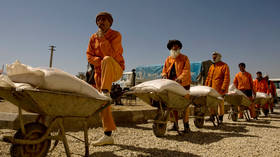Afghan public sector workers get paid in wheat

The Taliban administration has announced it is expanding its ‘food for work’ scheme under which it pays thousands of public sector employees with wheat instead of cash.
Roughly 40,000 workers in Kabul have been receiving 10 kilograms of wheat per day for working five hours. Agriculture officials have said that the program will now be extended across the country.
“We are ready to help our people as much as we can,” said Fazel Bari Fazli, deputy minister of administration and finance at the Ministry of Agriculture, Reuters reports.
The Taliban has been largely using the wheat that was donated by India to the previous US-backed Afghan government. The new government also received 18 tonnes of wheat from Pakistan last year and is expecting to receive more. Negotiations are also underway with India over a delivery of 55 tonnes, said Fazli.
The United Arab Emirates and Iran are among the other nations that have provided Afghanistan with food and medical supplies. The UN estimates that more than half the population needs humanitarian aid, with nearly a quarter already on the brink of starvation, according to a recent World Food Program report.
Afghanistan’s economic and humanitarian crisis has deepened since the Taliban took power in August, after the withdrawal of the US troops from the country. Since then, sanctions have been placed on members of the Taliban, the Afghan central bank’s assets have been frozen, and most of the foreign aid that supported the economy has been suspended.
The UN asked international donors on Tuesday to provide $4.4 billion in humanitarian aid to the country this year, citing “unprecedented levels of need amongst ordinary women, men and children of Afghanistan.” The aid is meant to bypass the government in Kabul and to be mostly distributed by international organizations.
For more stories on economy & finance visit RT's business section













